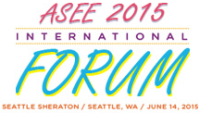EESD’15 Conference Theme: Professional Breadth and Technical Depth – Cultivating the T-Shaped Engineer
Engineering for sustainable development calls for engineering graduates who can both apply deep technical knowledge toward improving environmental and human well-being, and demonstrate a breadth in non-technical skills of the highest professional standards.
- Applying deep theoretical and applied technical knowledge—while not a new requirement of the graduating engineer—is becoming more complex. Traditional engineering fields are responding to unprecedented increases in both global population and per-capita consumption rates with new technologies and applications directed toward net-positive sustainability.
- Professional breadth connects engineering expertise to leadership, law, community development, ecology, business and entrepreneurship, public policy, humanitarianism and more. It aims to achieve an understanding of assumptions, knowledge, methods, and implications of an array of disciplines and ways of thinking, all viewed as an integrated whole.
- The highest quality professionalism includes an ability to exchange and exhibit mutual respect and understanding of ideas, philosophical principles, cognitive styles, and mind-sets as well as acts of integrity and purposeful personal reflection.
EESD15 will explore the challenges of cultivating the T-Shaped Engineer by sharing best practices in pedagogy innovation, curriculum re-design and assessment, community engagement in engineering education, student development, and more. All stakeholders in engineering education for sustainable development are invited to attend, including engineering academics, community partners, employers, educators from across the academy, students, professionals, non-governmental organizations, and curriculum developers.
Key Questions
The Conference Co-Chairs ask authors and delegates to consider the following key questions regarding engineering education for sustainable development.
- Expectations for EESD: What do employers and other stakeholders with a focus on sustainability expect from graduating engineers? How should education prepare graduates for the challenges young engineers will face during their careers?
- Social Innovation, systems thinking, and green technologies: How is the role of the engineer changing in society? What knowledge, skills, and attitudes will engineering for sustainable development require? Does teaching change?
- EESD for Highly Qualified Engineers: Do engineers graduating with Ph.D.s need EESD to succeed? Does research toward a “technical fix” require understanding of complexity science?
- Retrofitting Engineering Education: How are engineering programs retrofitting to incorporate sustainability education? Do trans-disciplinarity, leadership, or humanitarianism play roles in revised programmes? What is best practice?
- “Walking the Talk”: How do we monitor and continually improve EESD? How does the assessment of EESD fit with accreditation assessments and other regulatory evaluations of curriculum?
Papers that address these and other topics, are welcome.


